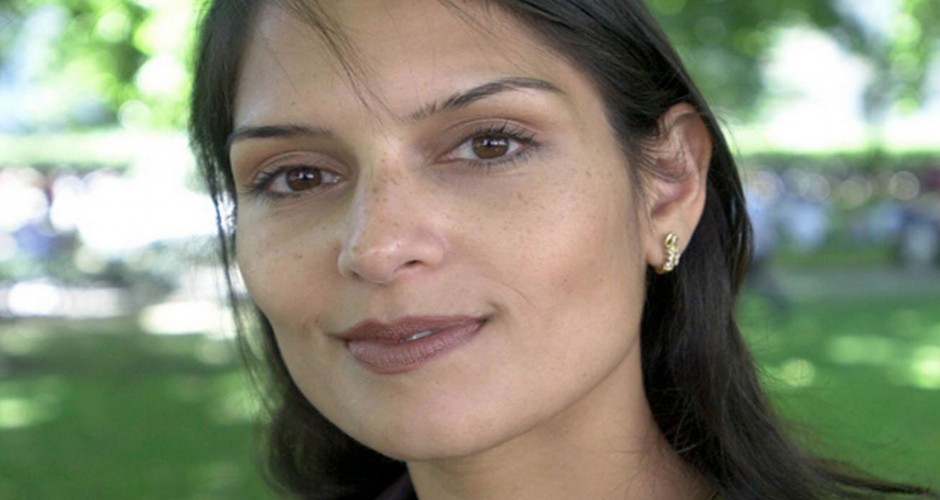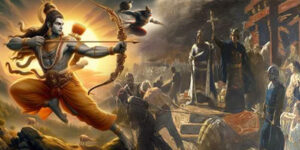With the continuous anti Hindu diatribe lead by the Western media covering the Indian elections has once again brought into the open the Hinduphobia prevalent in the West recycling misinformation and promoting well known Hinduphobes as ‘experts’ on India..
Recently BBCs Newsnight programme well known Hinduphobe William Dalrymple along with a new sidekick Anish Kapoor who went on a anti Modi rant including calling him a mass murderer went to its extremes was brought to the attention of British MP Priti Patel who wrote a strong letter condemning the attacks on Modi to the head of the BBC Lord Tony Hall : Letter produced below
Lord Tony Hall
Director-General
British Broadcasting Corporation
Broadcasting House
2-22 Portland Place
Fitzrovia London WlA lAA
19 May 2014
Our ref: WI7283
Dear Lord Hall
Re: BBC Newsnight,
16 May 2014, coverage and reporting of the Indian General Election. In my capacity as the Prime Minister’s UK Indian Diaspora Champion, and following recent engagement with leaders of Britain’s Indian community, I have received a number of complaints about the coverage about the Indian General Election on BBC Newsnight on 16 May 2014. Many in the British Indian community, particularly those of Gujarati origin,were offended by the reporting about Prime Minister-elect Narendra Modi. Instead of focusing on the policies and the vision that the new Government in India is now likely to implement, the programme focused exclusively on Modi and his character. From the beginning of the broadcast, Modi was portrayed by the presenter, Yalda Hakim, as a “controversial figure.” In the opening introduction, she stated: “What can India and the world expect from such a controversial figure.” Modi’s political opponents have portrayed him as being ‘controversial’, so by using this reference, the BBC, who should be impartial, is giving acceptance to the political position of Modi’s opponents rather than reporting objectively. The term ‘controversial’ could be used to describe a large number of politicians, which is why many people in Britain’s Indian community believe its use purely in relation to Modi in the news item was unbalanced.
Moreover, the presenter also stated, in relation to Modi, that “To some he has blood on his hands” (approximately 1 minute 20 seconds in) and that “Modi is India’s most divisive politician” (lm 30s). These are subjective statements that provide an misleading perspective of Modi while providing viewers with misinformation. Modi secured the largest democratic mandate in world history in a peaceful and professional manner, with his Party winning a majority of votes throughout India and able to form a Government. This was a point that was not conveyed by the presenter.
Later in the broadcast, at approximately 10m, the presenter stated that: “Modi is one of India’s most divisive politicians, his involvement in the 2002 Gujarat riots has been especially controversial.” However, she did not give further details about these events and the investigations and inquiries which took place and cleared Modi. Nor were the causes of the riots mentioned. Moreover, although the deaths of Muslims in the riots were referred to, at no point were the deaths of Hindus referred to, despite the fact that these were reported on the BBC website in 2005
(http:/ /news.bbc.co.uk/1/hi/world/south asia/ 4536199.strn). Therefore, the impression give to the viewer is that Muslims were the only community adversely affected by the riots. Coupled with the frequent references to Modi and the BJP being Hindu nationalists, the manner of reported created an inaccurate representation of the riots and portrayed the insinuation made by Modi’s political opponents that he was, in some way, involved in the riots. The broadcast also featured comment from the artist Anish Kapoor, who was critical of Modi. The decision to interview Kapoor and effectively portray him as an expert on Indian politics is bizarre. Kapoor has spent the last 40 years living in the UK and is an artist. He has no record as an expert on politics or commentator on Indian affairs. Moreover, the presenter did not offer sufficient or adequate challenge to the assumptions he made about the elections and comments he made about Modi. Kapoor stated in the interview in a clip that was also used in the introduction to the programme that “India’s dreamed itself a dream with a mass murderer as its main character.” Although the presenter asked him what he meant by mass murder, she did not challenge him to provide evidence to support his claim. Claiming that someone who is a democratically elected politician is a “mass murderer” is an extremely serious allegation and unless such a claim is substantiated with meaningful evidence, the BBC should not be broadcasting this slur.
Furthermore, when explaining what he meant by the phrase “mass murderer”, Kapoor stated that India is “on the edge of a sectarian, partisan, violent approach to all kinds of issues.” (approx 12m). The presenter did not challenge him over this statement either. Most mainstream commentators on Indian politics would not concur with Kapoor’s view, which is why the presenter should have challenged him. In addition, Kapoor also stated that in India there is growth at the cost of women, the poor and Muslims (approx 12m 30s). The interview then stopped and Kapoor was not challenged on this allegation either.
In addition, during the course of the interview, Kapoor referred to the elections and Indian politics as “supposedly democratic.” (approx lOm 30s). This implies that the elections in India were not in some way free and fair. Given that there have been no serious allegations of malpractice and that the elections involved over 550 million people casting their vote, it is concerning to see that the presenter did not challenge Kapoor on this claim.
Aside from the complete lack of balance and challenge by the presenter in relation to the Kapoor interview, the focus on Modi himself detracted attention away from the real election issues. These elections represent the largest democratic exercise in human history that saw the highest voter turnout in India’s historv. Indians were voting in the election on economic and social issues, voting on India’s economy, its trading aspirations and it vision for its place in the world. Newsnight’ s coverage could also have been more about breaking through voter apathy and mobilising first time voters to exercise their right to vote. It was indeed these new voters and technology that helped communicate political messages that helped to shape the outcome of this historic General Election.
As a result of this programme, the image of India has been tarnished unfairly and the success of the elections, the high turnout and the debates about the policies that were at the heart of the General Election have been ignored.
On behalf of all those offended in Britain’s Indian community by the Newsnight coverage, I trust you will undertake a full investigation into this programme and I look forward to your reply.
Yours sincerely,
Priti Patel MP (WITHAM)
HOUSE OF COMMONS – LONDON
The Prime Minister’s UK Indian Diaspora Champion
E-mail: withammp@parliament.uk
Website: www.pritipatelmp.com
Also Read : Anish Kapoor : Behind the Mask






























